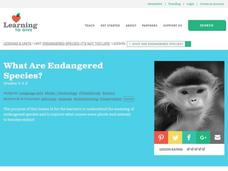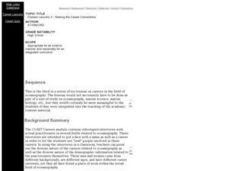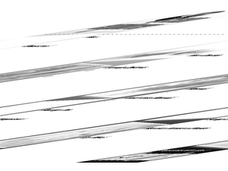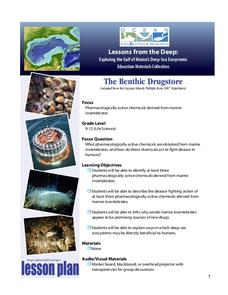Curated OER
Understanding Science Vocabulary And Categorization
Young scholars explore and examine scientific language and categorization as related to commonly known plants and animals. They hypothesize about a specific plant or animal, how it was scientifically named, what concepts and vocabulary...
Curated OER
Life Science: DNA Whodunit?
Students role play an honorary detective to assist in solving a crime committed. They investigate by a bank robbery and interview eyewitnesses using their Crime Investigation Notebook and clues from an eyewitness account from the...
Curated OER
Cells: The Units of Life
In this cells worksheet, 9th graders identify and use a microscope to look at cells. They explain the purpose for a microscope and how to find the total magnifying power of a microscope. Students also determine what would cause an image...
Curated OER
What's That Habitat?
Fourth graders explore the environment by researching animal characteristics. For this habitat identification lesson, 4th graders utilize paper and crayons to illustrate their own habitats or homes and discuss what it contains that is...
Curated OER
Life Science: Exploring Our Human Bodies
Students explore the concept of the human body. They complete a variety of activities concerning the function of various organs. They listen to their heartbeat with a stethoscope, examine how muscles work during a game of tag, and play...
Curated OER
What Are Endangered Species?
Students explore the concepts of endangered and extinct animals. For this animal protection lesson, students discuss and define the words endangered, extinct, and habitat. Students share why they think it is important to protect...
Curated OER
What is evolution and how does it work?
Learners discuss the theory of evolution. In this evolution instructional activity, students discover Charles Darwin and his ideas of heredity, variation, and selection. This instructional activity gives information for the learners to...
Curated OER
Ocean Life: A Heavy Subject
Second graders examine The Learning Page Fact Files about ocean life and categorize the data by weight and group. They distinguish between fish, mammals, and invertebrates and which weigh the most and the least. Students record their...
Curated OER
Who is the Sea Otter Related to?
Students examine the genetic relationships of different organisms. In groups, they discover the importance of genes and how different amino acids show various evolutionary relationships. They use an online database to continue their...
Curated OER
Life Before Kindergarten
Students investigate the life that takes place before going to kindergarten. They brainstorm about some of the key events that are common for children entering school. Students create two drawings about life before kindergarten and...
PBS
The Egg
The first stage in the butterfly's life cycle is the egg. Young entomologists discuss why different butterflies lay different eggs and what their eggs look like. Then they use the handouts to make a replica of one type of butterfly egg...
Curated OER
Home Living / Daily Living: Importance of Keeping a Healthy Body Weight
Prepare your special education class for a healthy life. They visit with a nutritionist, practice simple exercises, and discuss healthy food choices. They then make goals for weight loss and management. Additional supporting activity...
Curated OER
Do You See What I See?
Young scholars engage in a lesson that differentiates between right and wrong types of observations. In order to conduct the experiment they are provided with leaves and nameless objects with different designs. The two are compared and...
Curated OER
LESSON #2 SAFETY UNIT: Real-life reading selection
When studying pollution and the environment, you can use this activity as an enrichment. Safety-conscious learners read a 2005 article about an ammonia leak from a Kentucky fast-food product plant. They work in small groups to discuss...
Curated OER
Science: Making Career Connections
Students explore careers in oceanography. They compare and contrast requirements for careers in the field, and determine what high school courses would help to prepare them. Finally, they create a computer-based project related to...
Curated OER
Are You Aware?
Bring the five senses to life with a fun science experiment! Kindergartners and first graders read an explanation of the five senses, then identify which items Sophia can sense if she is blindfolded. A science explanation at the bottom...
Space Awareness
Star in a Box
What happens to stars as they get older? A simulation takes pupils through the life cycle of stars based on their masses. The resource introduces the Hertzsprung-Russell diagram and the common relationships and life cycle patterns observed.
Curated OER
Natural Disaster
Describe how plate tectonics account for various land formations. Learners discuss different marine sanctuaries and create a poster about tectonic activity in these areas. They share their posters with the class.
Science Friday
Fossil Detectives
What can this rock be? Pupils pretend to be paleontologists by sketching fossils and making predictions about their types. To determine whether they can identify the type of dinosaur, class members compare their observations and...
Exploratorium
Your Sense of Taste
A simple and sweet activity shows students how important smell is in interpreting flavor. Pairs of pupils hold their noses and eat Life Savers®, only to find that they can't identify the flavors until they let go. You will appreciate...
Curated OER
Anchialine Cave Species
Ever heard of a stygofauna or a stygobite? How about an anchialine cave? Set your young biologists on a quest to find information about organisms that live in and have adapted to life in caves located near the water. Class members then...
Sea World
Endangered Species
Study different endangered species with several activities that incorporate math, science, language arts, and research strategies. A great addition to your activity on conservation or Earth Day.
NOAA
Importance of Deep-Sea Ecosystems – The Benthic Drugstore
You never know what you will find next in the deep sea ecosystem. So far, scientists have found items that work as anti-tumor agents, anti-inflammatory agents, agents that stop uncontrolled cell division, and much more. The lesson begins...
Curated OER
Biotechnology Laboratory Research
Learners participate in an extended laboratory research to experience how scientific information is obtained, upon which we build scientific knowledge and understanding.























